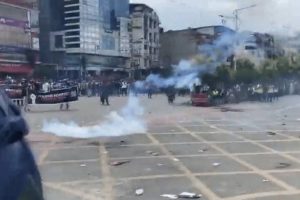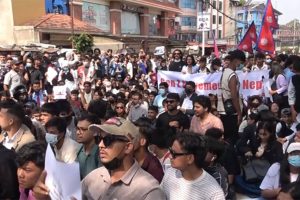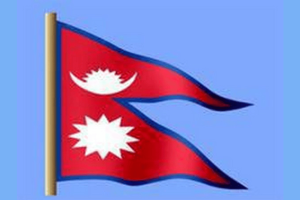The ruling coalition between the Communist Party of Nepal (Maoist Centre) and the Sheh Bahadur Deuba-headed Nepali Congress has collapsed in the Himalayan country, and a new coalition government under Prime Minister Pushpa Kumar Dahal will on Monday swear in a fresh council of ministers, according to former Finance Minister Surendra Pandey.
In a post on Facebook, Pandey, the Vice Chairman of the Communist Party of Nepal- Unified Marxist Leninist (CPN- UML), said, “Government to change today. New cabinet to be formed. Swearing in of small number of ministers to take place today.”
The Left Alliance coalition will be amalgamation of four political parties- the Prime Minister Pushpa Kumar Dahal-led Communist Party of Nepal (Maoist Centre), the Communist Party of Nepal-Unified Marxist Leninist (CPN- UML), the Rastriya Swatantra Party and the Janata Samajbadi Party.
Officials from the PM’s Secretariat confirmed to ANI that Dahal will continue to hold the Prime Minister’s post and is set to induct ministers recommended by the parties in the new coalition.
The latest cabinet reshuffle comes a year after formation of the government after the last general elections.
Dahal, known for his flip-flops in politics, became Prime Minister last year with the support of CPN-UML and other parties whom he ditched within three months forging alliance with Nepali Congress.
The widening distance between the Maoist Centre and Nepali Congress, two big parties in Nepal, over the claim for chairmanship of the National Assembly threatened an already fragile ruling coalition.
The Maoist Centre upon concluding its Standing Committee meeting on February 28 decided to contest for the chairmanship of National Assembly.
Chairman of Maoist Centre and Nepal’s incumbent PM Pushpa Kamal Dahal had previously assured Nepali Congress (NC) that it would support Congress during the election for Chairman of Upper House or the National Assembly.
“Our comrades suggested that the party should field own candidate for the post (Chairman of National Assembly) in the Standing Committee meeting, and has been decided accordingly,” Agni Prasad Sapkota, the spokesperson of the Maoist Centre had said.
A day later, on February 29, Pushpa Kamal Dahal upon landing at Chitwan district’s Bharatpur reiterated the claim stating developments has taken a new turn.
“Majority of our standing committee has voted to field candidate from the party for the post of Chairman of National Assembly. Though no written decision has been made over the demands made within the party but the developments has taken a new turn from the time when we (Maoist Centre and Nepali Congress) had made the agreement. I indeed had said that we were positive if Krishna Situala will be field for the post (NA Chairman),” Dahal told media after landing in Bharatpur.
At a party meeting of the Nepali Congress on February 19, voices against coalition at the time of election soared high and it decided to contest the next election slated for 2026 without forging any alliance.
Meanwhile, Dahal also alleged the loss of a National Assembly seat in Koshi Province to the Nepali Congress and said that his party cadres and leaders were upset about it.
The election for National Assembly Chairman is scheduled for March 12 and filing candidatures for the post was slated for March 7.
The Maoist Centre emerged as largest party in the National Assembly after the election held in February. The chair of the National Assembly is also a member of the Constitutional Council that recommends office bearers for constitutional bodies.
Currently, the Maoist Centre has 17 seats, the Nepali Congress has 16 seats, the Communist Party of Nepal- Unified Marxist Leninist (CPN-UML) has 19 seats, the CPN (Unified Socialist) has 8 seats, the Janata Samajbadi Party has 3 seats and the Rastriya Janamorcha and Loktantrik Samajbadi Party have one seat each in the National Assembly.
A total of 58 seats were contested in the 59-member National Assembly, the upper house of Parliament in Nepal, held on January while one seat still remains vacant which will be appointed by Nepal President Ram Chandra Paudel on the recommendation of the Cabinet.





